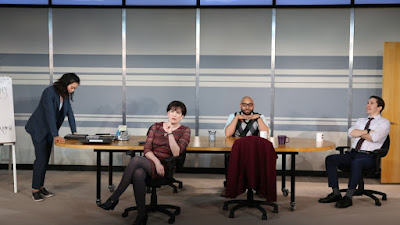Theater Review: A surreal and witty examination of women in a male workplace
Do You Feel Anger?
Written by Mara Nelson-Greenberg
Directed by Margot Bordelon
Vineyard Theater, Manhattan
April 23, 2019
Mara Nelson-Greenberg is another example this season of a young
playwright given a chance to have a play produced off Broadway. The New York
Times recently featured articles and a roundtable discussion of young black playwrights whose works appeared this season, so this youth
movement is quite a trend in New York theater--no more paying your dues for years
prior to getting a play produced. While the resultant plays can be
inconsistent, plays like Do You Feel
Anger? justify the strategy. This was a fresh, creative play with its own
unique voice. It also gave a millennial woman the chance to comment on the hot
topic of sexism in the workplace. She demonstrated
a refreshing style and perspective quite different from that of older women writers,
and certainly from that of men.
I have never seen a play written quite like this one. It
mixed farce with contemporary commentary (and tragedy) in a unique way, as if a
Theater of the Absurd play by Beckett or Ionesco was updated into the modern
workplace. But unlike those playwrights’ works, this play never felt
consciously modern or experimental or difficult—just delightfully quirky. The
play is set in a bland corporate conference room where an “empathy coach” (Tiffany
Villarin) is brought in to quell office abuse and discord at a firm whose employees
do bill collection by phone. The office is rife with abuse of customers and
particularly with abuse of women employees. Women in the office are
propositioned, demeaned, joked about (in their presence), even “mugged”, or
physically jostled. One woman is represented by only her bags, since she
disappeared to the restroom weeks ago, never again to return. The empathy coach
tries to lead the men (and one woman) through a series of exercises designed to
help them understand each other, and the customers. But it’s a tough slog,
since the men seem completely detached from other people, and see women only as
sex objects. When doing an exercise in goal setting, one guy says his is “unreciprocated
oral sex”, which becomes a mantra, chanted again and again by the men during the
play. While all of this sounds gloomy, the playwright combines it with wild use
of language, and farcical moments. When advised that he should install a tampon
dispenser in the women’s restroom, the boss looks incredulous, then asks what
tampons are used for, then texts his assistant to ask what a woman’s “period”
is, then dissolves in terror once this is explained. Another male employee
responds when challenged with nonsensical French words and really bad poetry (“empathy
is a bird”). Perhaps best was the bullying Howie, played with sublime farcical
nonverbal and verbal humor by Justin Long. His creative physical gesturing and extreme
facial expressions took the already farcical dialogue to a higher level. I
think the oddly surreal dialogue was the playwrights’ view of the coded office
speech and behavior that excludes so many women (and others) in some
workplaces.
I always worry that these sorts of plays will run out of
steam once we settle into their basic style and vibe. This one managed to stay
funny and topical throughout its 80-minute single act. This was in part due to
a big coup de theatre near the end, where the set suddenly (and brilliantly)
changes from the sterile corporate board room to a fantasy women’s restroom.
Here we meet the long-lost employee, who has been hanging out there for weeks;
here the female employees take on fantasy roles, including that of a mermaid. The
message seems to be that the only really safe place for women in the workplace
is in a fantasy restroom. Maybe that’s why so many women in old movies escape
dinner together by going to the ladies’ room. This also reminded me of an old
SNL skit, where the ladies’ room was portrayed as a lavish spa, with beefcake
guys fanning and servicing the women who retired there…the Ladies Room Men Do Not
See.
The main reason the play stayed potent throughout was that
the author was nimbly able to alternate farce with real angst. The main female
employee also speaks in her own ridiculous ways, trying to join the male
culture, awkwardly. But a few times, with the support of the empathy coach, she
was able to speak honestly about her fear of abuse. The men are utterly unable
to process such honesty, responding with either inappropriate jokes or over the
top stress responses. In the end, Do You
Feel Anger? showed little optimism
that we are on the way to creating an egalitarian mixed gender environment.
That it did so with so much humor and creativity is a testament to the talents
of its young playwright.


Comments
Post a Comment